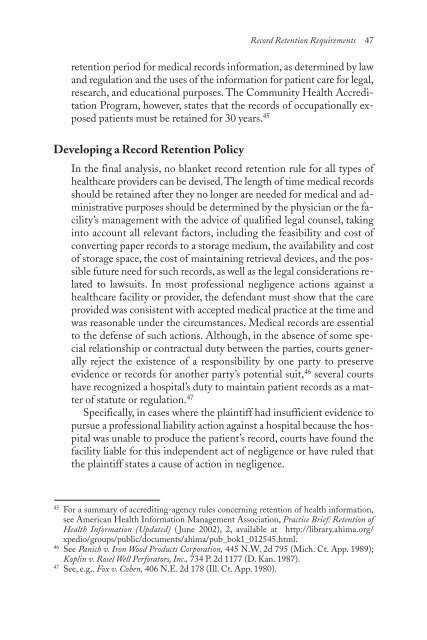- Page 2:
Fourth EditionMedicalRecordsand the
- Page 5 and 6:
ivCONTENTSPhysician Ownership Model
- Page 7 and 8:
viCONTENTSHybrid Entities, Affiliat
- Page 9 and 10:
viiiCONTENTSChapter 8Chapter 9Docum
- Page 11 and 12:
xCONTENTSTheories of Liability 400D
- Page 13 and 14:
xiiCONTENTSState HIPAA Statutes 531
- Page 15 and 16:
xivPREFACEand accessible text and a
- Page 18 and 19: About the AuthorsWilliam H. Roach,
- Page 20: About the Authorsxixaged care compa
- Page 23 and 24: 2 CHAPTER 1: INTRODUCTION TO THE AM
- Page 25 and 26: 4 CHAPTER 1: INTRODUCTION TO THE AM
- Page 27 and 28: 6 CHAPTER 1: INTRODUCTION TO THE AM
- Page 29 and 30: 8 CHAPTER 1: INTRODUCTION TO THE AM
- Page 31 and 32: 10 CHAPTER 1: INTRODUCTION TO THE A
- Page 33 and 34: 12 CHAPTER 1: INTRODUCTION TO THE A
- Page 35 and 36: 14 CHAPTER 1: INTRODUCTION TO THE A
- Page 37 and 38: 16 CHAPTER 1: INTRODUCTION TO THE A
- Page 39 and 40: 18 CHAPTER 1: INTRODUCTION TO THE A
- Page 41 and 42: 20 CHAPTER 2: MEDICAL RECORDS AND M
- Page 43 and 44: 22 CHAPTER 2: MEDICAL RECORDS AND M
- Page 45 and 46: 24 CHAPTER 2: MEDICAL RECORDS AND M
- Page 47 and 48: 26 CHAPTER 2: MEDICAL RECORDS AND M
- Page 49 and 50: 28 CHAPTER 2: MEDICAL RECORDS AND M
- Page 51 and 52: 30 CHAPTER 2: MEDICAL RECORDS AND M
- Page 53 and 54: 32 CHAPTER 3: MEDICAL RECORDS REQUI
- Page 55 and 56: 34 CHAPTER 3: MEDICAL RECORDS REQUI
- Page 57 and 58: 36 CHAPTER 3: MEDICAL RECORDS REQUI
- Page 59 and 60: 38 CHAPTER 3: MEDICAL RECORDS REQUI
- Page 61 and 62: 40 CHAPTER 3: MEDICAL RECORDS REQUI
- Page 63 and 64: 42 CHAPTER 3: MEDICAL RECORDS REQUI
- Page 65 and 66: 44 CHAPTER 3: MEDICAL RECORDS REQUI
- Page 67: 46 CHAPTER 3: MEDICAL RECORDS REQUI
- Page 71 and 72: 50 CHAPTER 3: MEDICAL RECORDS REQUI
- Page 73 and 74: 52 CHAPTER 4: MEDICAL RECORDS ENTRI
- Page 75 and 76: 54 CHAPTER 4: MEDICAL RECORDS ENTRI
- Page 77 and 78: 56 CHAPTER 4: MEDICAL RECORDS ENTRI
- Page 79 and 80: 58 CHAPTER 4: MEDICAL RECORDS ENTRI
- Page 81 and 82: 60 CHAPTER 4: MEDICAL RECORDS ENTRI
- Page 83 and 84: 62 CHAPTER 4: MEDICAL RECORDS ENTRI
- Page 85 and 86: 64 CHAPTER 4: MEDICAL RECORDS ENTRI
- Page 87 and 88: 66 CHAPTER 4: MEDICAL RECORDS ENTRI
- Page 89 and 90: 68 CHAPTER 4: MEDICAL RECORDS ENTRI
- Page 91 and 92: 70 CHAPTER 4: MEDICAL RECORDS ENTRI
- Page 93 and 94: 72 CHAPTER 4: MEDICAL RECORDS ENTRI
- Page 95 and 96: 74 CHAPTER 5: DOCUMENT CONSENT TO T
- Page 97 and 98: 76 CHAPTER 5: DOCUMENT CONSENT TO T
- Page 99 and 100: 78 CHAPTER 5: DOCUMENT CONSENT TO T
- Page 101 and 102: 80 CHAPTER 5: DOCUMENT CONSENT TO T
- Page 103 and 104: 82 CHAPTER 5: DOCUMENT CONSENT TO T
- Page 105 and 106: 84 CHAPTER 5: DOCUMENT CONSENT TO T
- Page 107 and 108: 86 CHAPTER 5: DOCUMENT CONSENT TO T
- Page 109 and 110: 88 CHAPTER 5: DOCUMENT CONSENT TO T
- Page 111 and 112: 90 CHAPTER 5: DOCUMENT CONSENT TO T
- Page 113 and 114: 92 CHAPTER 5: DOCUMENT CONSENT TO T
- Page 115 and 116: 94 CHAPTER 5: DOCUMENT CONSENT TO T
- Page 117 and 118: 96 CHAPTER 5: DOCUMENT CONSENT TO T
- Page 119 and 120:
98 CHAPTER 5: DOCUMENT CONSENT TO T
- Page 121 and 122:
100 CHAPTER 5: DOCUMENT CONSENT TO
- Page 124 and 125:
CHAPTER 6Access to Health Informati
- Page 126 and 127:
Types of Health Information 105Heal
- Page 128 and 129:
Types of Health Information 107The
- Page 130 and 131:
Types of Health Information 109•
- Page 132 and 133:
Designated Record SetOwnership of t
- Page 134 and 135:
Ownership of the Medical Record 113
- Page 136 and 137:
Summary of Confidentiality Requirem
- Page 138 and 139:
Summary of Confidentiality Requirem
- Page 140 and 141:
Summary of Confidentiality Requirem
- Page 143 and 144:
122 CHAPTER 6: ACCESS TO HEALTH INF
- Page 145 and 146:
124 CHAPTER 6: ACCESS TO HEALTH INF
- Page 147 and 148:
126 CHAPTER 6: ACCESS TO HEALTH INF
- Page 149 and 150:
128 CHAPTER 6: ACCESS TO HEALTH INF
- Page 151 and 152:
130 CHAPTER 6: ACCESS TO HEALTH INF
- Page 153 and 154:
132 CHAPTER 6: ACCESS TO HEALTH INF
- Page 155 and 156:
134 CHAPTER 6: ACCESS TO HEALTH INF
- Page 157 and 158:
136 CHAPTER 6: ACCESS TO HEALTH INF
- Page 159 and 160:
138 CHAPTER 6: ACCESS TO HEALTH INF
- Page 161 and 162:
140 CHAPTER 6: ACCESS TO HEALTH INF
- Page 163 and 164:
142 CHAPTER 6: ACCESS TO HEALTH INF
- Page 165 and 166:
144 CHAPTER 6: ACCESS TO HEALTH INF
- Page 167 and 168:
146 CHAPTER 6: ACCESS TO HEALTH INF
- Page 169 and 170:
148 CHAPTER 6: ACCESS TO HEALTH INF
- Page 171 and 172:
150 CHAPTER 6: ACCESS TO HEALTH INF
- Page 173 and 174:
152 CHAPTER 6: ACCESS TO HEALTH INF
- Page 175 and 176:
154 CHAPTER 6: ACCESS TO HEALTH INF
- Page 177 and 178:
156 CHAPTER 6: ACCESS TO HEALTH INF
- Page 179 and 180:
158 CHAPTER 6: ACCESS TO HEALTH INF
- Page 181 and 182:
160 CHAPTER 6: ACCESS TO HEALTH INF
- Page 183 and 184:
162 CHAPTER 6: ACCESS TO HEALTH INF
- Page 185 and 186:
164 CHAPTER 6: ACCESS TO HEALTH INF
- Page 187 and 188:
166 CHAPTER 6: ACCESS TO HEALTH INF
- Page 189 and 190:
168 CHAPTER 6: ACCESS TO HEALTH INF
- Page 191 and 192:
170 CHAPTER 6: ACCESS TO HEALTH INF
- Page 193 and 194:
172 CHAPTER 6: ACCESS TO HEALTH INF
- Page 195 and 196:
174 CHAPTER 6: ACCESS TO HEALTH INF
- Page 197 and 198:
176 CHAPTER 6: ACCESS TO HEALTH INF
- Page 199 and 200:
178 CHAPTER 6: ACCESS TO HEALTH INF
- Page 201 and 202:
180 CHAPTER 6: ACCESS TO HEALTH INF
- Page 203 and 204:
182 CHAPTER 6: ACCESS TO HEALTH INF
- Page 205 and 206:
184 CHAPTER 6: ACCESS TO HEALTH INF
- Page 207 and 208:
186 CHAPTER 6: ACCESS TO HEALTH INF
- Page 209 and 210:
188 CHAPTER 6: ACCESS TO HEALTH INF
- Page 211 and 212:
190 CHAPTER 6: ACCESS TO HEALTH INF
- Page 213 and 214:
192 CHAPTER 6: ACCESS TO HEALTH INF
- Page 215 and 216:
194 CHAPTER 6: ACCESS TO HEALTH INF
- Page 217 and 218:
196 CHAPTER 6: ACCESS TO HEALTH INF
- Page 219 and 220:
198 CHAPTER 6: ACCESS TO HEALTH INF
- Page 221 and 222:
200 CHAPTER 6: ACCESS TO HEALTH INF
- Page 223 and 224:
202 CHAPTER 6: ACCESS TO HEALTH INF
- Page 225 and 226:
204 CHAPTER 6: ACCESS TO HEALTH INF
- Page 227 and 228:
206 CHAPTER 6: ACCESS TO HEALTH INF
- Page 229 and 230:
208 CHAPTER 6: ACCESS TO HEALTH INF
- Page 231 and 232:
210 CHAPTER 6: ACCESS TO HEALTH INF
- Page 233 and 234:
212 CHAPTER 6: ACCESS TO HEALTH INF
- Page 235 and 236:
214 CHAPTER 6: ACCESS TO HEALTH INF
- Page 237 and 238:
216 CHAPTER 6: ACCESS TO HEALTH INF
- Page 239 and 240:
218 CHAPTER 6: ACCESS TO HEALTH INF
- Page 241 and 242:
220 CHAPTER 6: ACCESS TO HEALTH INF
- Page 243 and 244:
222 CHAPTER 6: ACCESS TO HEALTH INF
- Page 245 and 246:
224 CHAPTER 6: ACCESS TO HEALTH INF
- Page 247 and 248:
226 CHAPTER 6: ACCESS TO HEALTH INF
- Page 249 and 250:
228 CHAPTER 6: ACCESS TO HEALTH INF
- Page 251 and 252:
230 CHAPTER 6: ACCESS TO HEALTH INF
- Page 253 and 254:
232 CHAPTER 6: ACCESS TO HEALTH INF
- Page 255 and 256:
234 CHAPTER 6: ACCESS TO HEALTH INF
- Page 257 and 258:
236 CHAPTER 6: ACCESS TO HEALTH INF
- Page 259 and 260:
238 CHAPTER 6: ACCESS TO HEALTH INF
- Page 261 and 262:
240 CHAPTER 6: ACCESS TO HEALTH INF
- Page 263 and 264:
242 CHAPTER 6: ACCESS TO HEALTH INF
- Page 265 and 266:
244 CHAPTER 6: ACCESS TO HEALTH INF
- Page 268 and 269:
CHAPTER 7Reporting and DisclosureRe
- Page 270 and 271:
Disclosures Required by Law 249The
- Page 272 and 273:
Disclosures Required by Law 251port
- Page 274 and 275:
Abuse of Adults and Injuries to Dis
- Page 276 and 277:
Disclosures Required by Law 255tity
- Page 278 and 279:
Disclosures Required by Law 257(suc
- Page 280 and 281:
Disclosures Required by Law 259The
- Page 282 and 283:
Disclosures Required by Law 261be c
- Page 284 and 285:
Other Health Related Reporting Requ
- Page 286 and 287:
Other Health Related Reporting Requ
- Page 288 and 289:
CHAPTER 8Documentation and Disclosu
- Page 290 and 291:
Special Documentation Concerns 269r
- Page 292 and 293:
Special Documentation Concerns 271T
- Page 294 and 295:
Special Documentation Concerns 273w
- Page 296 and 297:
Celebrity PatientsSpecial Documenta
- Page 298 and 299:
Special Documentation Concerns 277t
- Page 300 and 301:
BackgroundSpecial Documentation Con
- Page 302 and 303:
Special Documentation Concerns 281g
- Page 304 and 305:
Special Documentation Concerns 283m
- Page 306 and 307:
Special Documentation Concerns 285m
- Page 308 and 309:
Special Documentation Concerns 287A
- Page 310 and 311:
Special Documentation Concerns 289r
- Page 312 and 313:
Special Documentation Concerns 291p
- Page 314 and 315:
Special Disclosure Concerns 293mark
- Page 316 and 317:
Special Disclosure Concerns 295clos
- Page 318 and 319:
Special Disclosure Concerns 297•
- Page 320 and 321:
Special Disclosure Concerns 299thor
- Page 322 and 323:
Special Disclosure Concerns 301stan
- Page 324 and 325:
“Good Cause” to Obtain Adoption
- Page 326 and 327:
Special Disclosure Concerns 305plac
- Page 328 and 329:
Special Disclosure Concerns 307fede
- Page 330 and 331:
Special Disclosure Concerns 309exam
- Page 332 and 333:
State Law ProvisionsSpecial Disclos
- Page 334 and 335:
Special Disclosure Concerns 313Heal
- Page 336 and 337:
Special Disclosure Concerns 315the
- Page 338 and 339:
Special Disclosure Concerns 317rele
- Page 340 and 341:
Special Disclosure Concerns 319reco
- Page 342 and 343:
Special Disclosure Concerns 321give
- Page 344 and 345:
Special Disclosure Concerns 323reco
- Page 346 and 347:
Special Disclosure Concerns 325crea
- Page 348 and 349:
Special Disclosure Concerns 327It i
- Page 350 and 351:
Special Disclosure Concerns 329the
- Page 352 and 353:
Special Disclosure Concerns 331ance
- Page 354 and 355:
Special Disclosure Concerns 333to c
- Page 356 and 357:
Special Disclosure Concerns 335In g
- Page 358 and 359:
Special Disclosure Concerns 337conf
- Page 360 and 361:
Special Disclosure Concerns 339AHIM
- Page 362:
Special Disclosure Concerns 341or r
- Page 365 and 366:
344 CHAPTER 9: HIV/AIDS: MANDATORY
- Page 367 and 368:
346 CHAPTER 9: HIV/AIDS: MANDATORY
- Page 369 and 370:
348 CHAPTER 9: HIV/AIDS: MANDATORY
- Page 371 and 372:
350 CHAPTER 9: HIV/AIDS: MANDATORY
- Page 373 and 374:
352 CHAPTER 9: HIV/AIDS: MANDATORY
- Page 375 and 376:
354 CHAPTER 9: HIV/AIDS: MANDATORY
- Page 377 and 378:
356 CHAPTER 9: HIV/AIDS: MANDATORY
- Page 379 and 380:
358 CHAPTER 9: HIV/AIDS: MANDATORY
- Page 381 and 382:
360 CHAPTER 9: HIV/AIDS: MANDATORY
- Page 383 and 384:
362 CHAPTER 9: HIV/AIDS: MANDATORY
- Page 385 and 386:
364 CHAPTER 9: HIV/AIDS: MANDATORY
- Page 387 and 388:
366 CHAPTER 9: HIV/AIDS: MANDATORY
- Page 389 and 390:
368 CHAPTER 9: HIV/AIDS: MANDATORY
- Page 391 and 392:
370 CHAPTER 9: HIV/AIDS: MANDATORY
- Page 394 and 395:
CHAPTER 10Discovery and Admissibili
- Page 396 and 397:
Discoverability of Medical Records
- Page 398 and 399:
Discoverability of Medical Records
- Page 400 and 401:
Discoverability of Medical Records
- Page 402 and 403:
Discoverability of Medical Records
- Page 404 and 405:
Admissibility of Medical Records 38
- Page 406 and 407:
Admissibility of Medical Records 38
- Page 408 and 409:
Other Healthcare Documentation 387G
- Page 410 and 411:
Other Healthcare Documentation 389
- Page 412 and 413:
Other Healthcare Documentation 391t
- Page 414:
Admissibility of Incident ReportsBe
- Page 417 and 418:
396 CHAPTER 11: LEGAL THEORIES IN I
- Page 419 and 420:
398 CHAPTER 11: LEGAL THEORIES IN I
- Page 421 and 422:
400 CHAPTER 11: LEGAL THEORIES IN I
- Page 423 and 424:
402 CHAPTER 11: LEGAL THEORIES IN I
- Page 425 and 426:
404 CHAPTER 11: LEGAL THEORIES IN I
- Page 427 and 428:
406 CHAPTER 11: LEGAL THEORIES IN I
- Page 429 and 430:
408 CHAPTER 11: LEGAL THEORIES IN I
- Page 431 and 432:
410 CHAPTER 11: LEGAL THEORIES IN I
- Page 433 and 434:
412 CHAPTER 11: LEGAL THEORIES IN I
- Page 435 and 436:
414 CHAPTER 11: LEGAL THEORIES IN I
- Page 437 and 438:
416 CHAPTER 11: LEGAL THEORIES IN I
- Page 439 and 440:
418 CHAPTER 11: LEGAL THEORIES IN I
- Page 442 and 443:
CHAPTER 12Risk Management and Quali
- Page 444 and 445:
Relationship Between Risk Managemen
- Page 446 and 447:
Risk Management 425and occurrence s
- Page 448 and 449:
Quality Management 427• Reviewing
- Page 450 and 451:
Quality Management 429In its variou
- Page 452 and 453:
HIPAA and Risk Management/Quality M
- Page 454 and 455:
Compliance Programs 4333. In addres
- Page 456 and 457:
Compliance Programs 435• False Cl
- Page 458:
Medical Records in Risk Management
- Page 461 and 462:
440 CHAPTER 13: ELECTRONIC HEALTH R
- Page 463 and 464:
442 CHAPTER 13: ELECTRONIC HEALTH R
- Page 465 and 466:
444 CHAPTER 13: ELECTRONIC HEALTH R
- Page 467 and 468:
446 CHAPTER 13: ELECTRONIC HEALTH R
- Page 469 and 470:
448 CHAPTER 13: ELECTRONIC HEALTH R
- Page 471 and 472:
450 CHAPTER 13: ELECTRONIC HEALTH R
- Page 473 and 474:
452 CHAPTER 13: ELECTRONIC HEALTH R
- Page 475 and 476:
454 CHAPTER 13: ELECTRONIC HEALTH R
- Page 477 and 478:
456 CHAPTER 13: ELECTRONIC HEALTH R
- Page 479 and 480:
458 CHAPTER 13: ELECTRONIC HEALTH R
- Page 481 and 482:
460 CHAPTER 13: ELECTRONIC HEALTH R
- Page 483 and 484:
462 CHAPTER 13: ELECTRONIC HEALTH R
- Page 485 and 486:
464 CHAPTER 13: ELECTRONIC HEALTH R
- Page 487 and 488:
466 CHAPTER 13: ELECTRONIC HEALTH R
- Page 489 and 490:
468 CHAPTER 13: ELECTRONIC HEALTH R
- Page 491 and 492:
470 CHAPTER 13: ELECTRONIC HEALTH R
- Page 493 and 494:
472 CHAPTER 13: ELECTRONIC HEALTH R
- Page 495 and 496:
474 CHAPTER 13: ELECTRONIC HEALTH R
- Page 497 and 498:
476 CHAPTER 13: ELECTRONIC HEALTH R
- Page 499 and 500:
478 CHAPTER 13: ELECTRONIC HEALTH R
- Page 501 and 502:
480 CHAPTER 13: ELECTRONIC HEALTH R
- Page 503 and 504:
482 CHAPTER 13: ELECTRONIC HEALTH R
- Page 505 and 506:
484 CHAPTER 13: ELECTRONIC HEALTH R
- Page 507 and 508:
486 CHAPTER 13: ELECTRONIC HEALTH R
- Page 509 and 510:
488 CHAPTER 13: ELECTRONIC HEALTH R
- Page 511 and 512:
490 CHAPTER 13: ELECTRONIC HEALTH R
- Page 513 and 514:
492 CHAPTER 13: ELECTRONIC HEALTH R
- Page 515 and 516:
494 CHAPTER 13: ELECTRONIC HEALTH R
- Page 517 and 518:
496 CHAPTER 13: ELECTRONIC HEALTH R
- Page 519 and 520:
498 CHAPTER 13: ELECTRONIC HEALTH R
- Page 521 and 522:
500 CHAPTER 13: ELECTRONIC HEALTH R
- Page 523 and 524:
502 CHAPTER 13: ELECTRONIC HEALTH R
- Page 525 and 526:
504 CHAPTER 13: ELECTRONIC HEALTH R
- Page 527 and 528:
506 CHAPTER 13: ELECTRONIC HEALTH R
- Page 529 and 530:
508 CHAPTER 13: ELECTRONIC HEALTH R
- Page 531 and 532:
510 CHAPTER 13: ELECTRONIC HEALTH R
- Page 533 and 534:
512 CHAPTER 13: ELECTRONIC HEALTH R
- Page 536 and 537:
CHAPTER 14Health Information inMedi
- Page 538 and 539:
U.S. Federal Laws Relating to Acqui
- Page 540 and 541:
U.S. Federal Laws Relating to Acqui
- Page 542 and 543:
U.S. Federal Laws Relating to Acqui
- Page 544 and 545:
U.S. Federal Laws Relating to Acqui
- Page 546 and 547:
U.S. Federal Laws Relating to Acqui
- Page 548 and 549:
U.S. Federal Laws Relating to Acqui
- Page 550 and 551:
U.S. Federal Laws Relating to Acqui
- Page 552 and 553:
State Laws Relating to Acquisition
- Page 554 and 555:
International Laws Relating to Medi
- Page 556 and 557:
International Laws Relating to Medi
- Page 558 and 559:
International Laws Relating to Medi
- Page 560 and 561:
Other Guidance 539Other GuidanceIn
- Page 562:
Other Guidance 541rights of researc
- Page 565 and 566:
544 APPENDIX A: ACRONYMS AND DEFINI
- Page 567 and 568:
546 APPENDIX A: ACRONYMS AND DEFINI
- Page 569 and 570:
548 APPENDIX A: ACRONYMS AND DEFINI
- Page 571 and 572:
550 APPENDIX A: ACRONYMS AND DEFINI
- Page 573 and 574:
552 APPENDIX A: ACRONYMS AND DEFINI
- Page 575 and 576:
554 APPENDIX A: ACRONYMS AND DEFINI
- Page 577 and 578:
556 APPENDIX A: ACRONYMS AND DEFINI
- Page 579 and 580:
558 APPENDIX A: ACRONYMS AND DEFINI
- Page 582 and 583:
IndexAabortiondisclosure requiremen
- Page 584 and 585:
Index 563nature of law, 2-3overview
- Page 586 and 587:
Index 565clinical trials. see medic
- Page 588 and 589:
Index 567disclosures by victims, 32
- Page 590 and 591:
Index 569Do Not Resuscitate (DNR) o
- Page 592 and 593:
Index 571medical records destructio
- Page 594 and 595:
Index 573patient access to records,
- Page 596 and 597:
Index 575identity, 239-241, 486Illi
- Page 598 and 599:
Index 577organization of court syst
- Page 600 and 601:
Index 579of alcohol and drug abuse,
- Page 602 and 603:
Index 581Mississippi lawduplication
- Page 604 and 605:
Index 583Park Lane Medical Center v
- Page 606 and 607:
Index 585restricting uses of PHIs,
- Page 608 and 609:
Index 587quality management vs., 42
- Page 610 and 611:
Index 589supreme courts, state cour
- Page 612:
255-256HIPAA requirements, 243-245w











